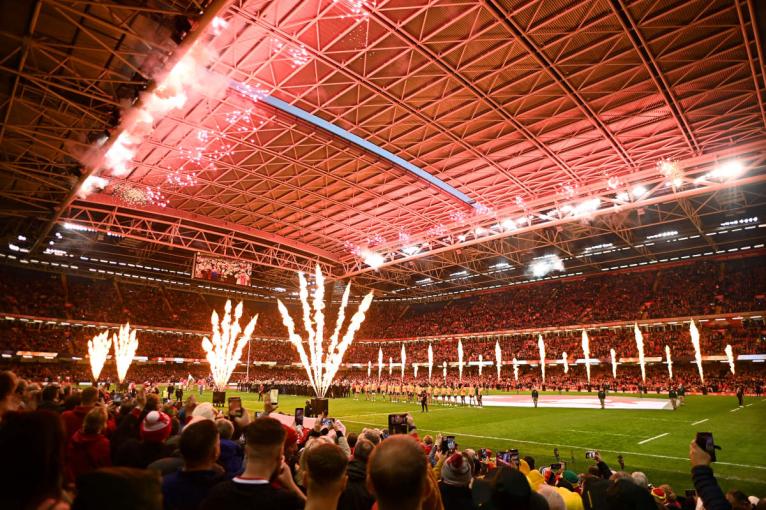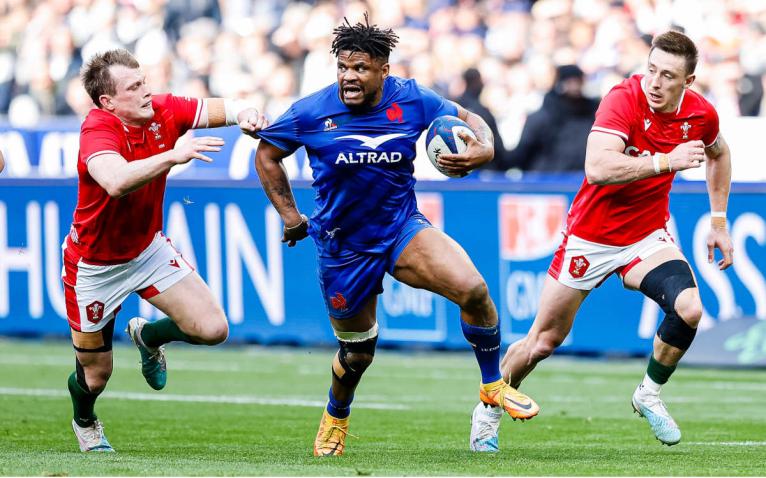If you’re new to the Six Nations jamboree and – perhaps – new to rugby, then, hopefully, you’re getting the hang of the thing after two weekends. The jive? Yes, well, that’s a bit cryptic, isn’t it? Who is this mysterious ‘16th man’? How do we really know whether players who ‘do all the unseen work’ are actually doing it properly or even at all? And what exactly is ‘the set-piece’ and why, and to what, does it have to be nailed? I hear you.
Look, unravelling this catalogue of hackneyed, often counterintuitive jargon is a fool’s errand. Let’s not go there. Simpler, instead, just to do what everyone else does; namely, memorise a few voguish idioms, phrases and buzzwords and recite them in your post-match watering hole or on social media. Don’t worry; no-one else will know what they’re talking about either. Okay, here we go.
RUGBY: Never forget, rugby’s a very simple game, this despite the fact the law book is heavier than a horse’s handbag. Bear in mind rugby matches are also 80 minutes long, which is why you have to play for the full 80. Rugby is also a game of two halves, worth jotting down if arithmetic isn’t your strong suit.
THE SIX NATIONS: Always refer to this as a pageant of noise and colour or, alternatively, a rich tapestry of famous auld fixtures where bragging rights are up for grabs. If you’re in the company of Kiwis and/or South Africans, be sure to tell them it’s the greatest rugby tournament in the world. Otherwise, just be rude about the English. You’ll fit right in.
STADIA: These are always cauldrons, although if you’re feeling lyrical, they can also be citadels or, on occasions, fortresses. Obviously, none of these apply to Twickenham (See SIX NATIONS). Wherever you are, refer to the intimidating atmosphere and how this is always a tough place to come and win. Unless, of course, you happen to be in Rome.

SCOTLAND: Scotland should always be described as dark horses. If you’re talking about Finn Russell – and, please, don’t waste your time talking about anyone else in a Scottish shirt – then the adjective you’ll need here is mercurial. If you’ve a basic grasp of what words actually mean, you’ll know he isn’t but that ship has long since sailed. Just stick with it. If in doubt, mention his soft hands and his ability to pull the strings but, whatever you do, always refer to him as the Lionel Messi of Rugby. If challenged on this – and, trust me, you won’t be – point to the fact both Russell and Messi once lived and worked in Paris.
ITALY: Italy are always the Azzurri and are best described as plucky, valiant, spirited, gallant or whichever other casual condescension you prefer.
FRANCE: The thing about France is that you never know which French team is going to turn up. What you should always mention is their flair, their panache and their free-flowing, champagne rugby, this despite the fact that their game’s based on a hairy-arsed bunch of forwards who’ve spent sixty-odd years beating the living crap out of other hairy-arsed bunches of forwards all over Europe. Talk sagely about the absence this year of Antoine Dupont; always refer to him as le petit géneral.
WALES: Wales are all about hwyl, which, as everyone knows, is Welsh for hwyl. If you’re English, pronounce this in any way you see fit.
ENGLAND: Tricky one. Talk about their ability to stay in the fight and to find a way to win, although do bear in mind this applies only when they’re playing teams who’re lower in the world rankings than they are.
IRELAND: Fill your boots here. Talk effusively about their rugby intelligence and their ability to back themselves and/or create something out of nothing. Refer to them as a quality side and talk at length about their depth, resilience and cutting edge; gabble on, too, about their no-fear environment, the brilliance of head coach Andy Farrell and their ability to put teams to the sword. Just don’t mention the World Cup, especially if you’re in a bar in Limerick.

BALL: The ball has got to be respected and looked after. Think of it as you would an elderly and much-loved relative.
DISCIPLINE: Teams simply have to maintain this and you should say so repeatedly, ideally while shaking your head.
PENALTY COUNT: Always significant, especially when it isn’t; Scotland shipped 16 in Cardiff and still came out on top. Better to concentrate on cheap penalties or compound penalties. Both of these should always be described as coach killers.
ERRORS: Everyone on the pitch will make these in the course of a game, understandably so given the high-pressure environment of Test rugby. Obviously, the only person out there who isn’t allowed to make any mistakes in the high-pressure environment of Test rugby is the referee.
TMO: Referring a decision to the TMO is going upstairs. In fact, the TMO is never upstairs; s/he will be sitting in the corner of some pokey TV truck out in the nearest car park. It doesn’t matter. Talk knowledgeably about protocols and guidelines even if you’ve no idea what exactly these are or how they’re applied. Don’t worry. No one else has a clue either.
CRAP MATCHES: The Six Nations is the greatest rugby tournament in the world (See SIX NATIONS) and does not serve up crap matches. In the unlikely event of dull, witless and/or torpid passages of play, describe the game as cagey or a real arm-wrestle.
FORWARDS: These are the large, often very ugly, people on the field who have to front up and make sure they do the hard yards, usually in the trenches, thereby ensuring their team is on the front foot. The set-piece is always your key point of reference here given you can’t win Test matches without a dominant set-piece. Actually, you can but, again, let’s not pick nits.
SCRUMMAGING: Never, ever refer to ‘scrums’; it’s always scrum-time. This is where props and hookers engage in the dark arts, despite the fact no-one, including props and hookers, has the first clue what these are. The important thing for the front rows – and always refer to this area as the coal face – is giving the referee a good picture, tough to do when you’re up to your cauliflower ears in the dark arts. Remember, too, the first scrum of the match will always be interesting.

LINE-OUTS: These are either functioning like clockwork or misfiring. There is no in-between position and no other means of describing them.
CATCH AND DRIVE MAULS: Refer to these as a rumble. If they’re Irish, they’re unstoppable. If they’re anyone else’s, they’re not.
ATTACK: There are myriad considerations here. Never underestimate the importance of going through the phases, despite the fact that – statistically – the more phases you go through, the less likely you are to score. Never forget, too, you have to earn the right to go wide. This, again, should be one of your staple axioms. Talk effusively about teams who’re good at moving the ball with pace or, alternatively, changing the point of attack. No-one has the first clue what this means, so you’ll be perfectly safe. Mention too the importance of getting over the gain line. Again, it’s as obvious as the trunk on an elephant but, even so, bang on about it at length.
DEFENCE: This should always be referred to as ‘D’. The key phrase here is line speed and, please, feel free to repeat this ad nauseum. Cast doubt on the effectiveness of the blitz defence, specifically, how it can leave you too narrow in the wider channels. Talk at length about soft edges – defending teams just don’t want to leave any – and the importance of bringing physicality. Given physicality is what distinguishes the sport from badminton, you’d think this would be self-evident but say it anyway. No one will notice.
THE KICKING GAME: This has got to be won. The key to effective kicking is the kick chase since a kick is only ever as good as the chase and, very often, vice versa. If you’re talking box kicks or restarts, the phrase hang time is always worth throwing in. Again, don’t concern yourself with what this actually means; you’ll sound authentic, which is what we’re after here. If challenged on why the kicking game is so important, simply say you have to play the game in the right areas. Take absolutely no questions on this.
MOMENTUM SHIFT: This is what happens when a team that’s losing suddenly starts winning. Obviously, it happens all the time but always refer to it as a momentum shift or, better still, a significant momentum shift.
BASICS: These have to be done well.
SHELLS: Teams simply can’t go into them.
THE RUCK: Always refer to this generically as the breakdown and talk scientifically about the importance of ruck speed. Never mind the breakdown is a s**t-fest of illegality and dark arts (See SCRUMMAGING); all that matters is getting quick ball or slowing down the opposition’s ball. It’s also worth mentioning counter-rucking, which is essentially just rucking with the word ‘counter’ tacked on the front.
BIG BALL-CARRIERS: Given everyone on the pitch lives in a gym and will at some point in the game carry the ball, it’s tough to work out why certain teams just don’t have enough big ball-carriers. Again, don’t get too literal here or you’ll look like some prep school ingénue. Just say it and move on.

SCOREBOARD PRESSURE: This is a key area for the serious bluffer. Talk earnestly about the need to build scoreboard pressure, usually by taking the three. No matter that Ireland routinely build scoreboard pressure by backing themselves to take the seven, just bang on about the importance of taking the three. If challenged, just say it’s all about coming away from the opposition 22 with points; alternatively, talk about red zone efficiency or playing the percentages. The other obvious word here is clinical. Why? Because teams have just got to be.
PLAYERS: Players are always proud to pull on that famous jersey. They’re not jerseys and haven’t been for nigh-on fifty years but this isn’t important. Players playing well in the Six Nations should always be described as a shoo-in for the Lions, even though, right now, this applies only to the Irish and to the mercurial Finn Russell. (See SCOTLAND).
PROCESSES: These have to be stuck to or, if you’re a grammatical pedant, they’re things to which you have to stick.
WOUNDED ANIMALS: These are teams who’ve been savaged the previous week and who, supposedly, will be all that more dangerous the week after, as in, they’re a wounded animal right now. Again, I’m not sure this is entirely logical. Ask yourself: would you rather fight a rabbit with three broken ribs or a fully-fit rabbit who can bench press 200kg? It’s a no-brainer, isn’t it? Put it this way, France got torn to pieces by Ireland in Marseille and turned up at Murrayfield a week later and – ahem – played like a team that’d just been torn to pieces by Ireland in Marseille. No matter; talk about an inevitable backlash or perhaps even the need to bring a fresh mindset. Remember, struggling teams will be determined to turn up and play as opposed to not turning up at all and going home for a cup of tea.
WINGERS: And, finally, wingers, who are always electric and never more so than when they’re in a footrace or showing off their dancing feet. The key differentiation here is whether they come off their wing looking for work. Talk knowledgeably about this, irrespective of whether you know what it actually means. Remember, too, that the best wingers just love to run with the ball and know their way to the try line. Frankly, it’d be a bit of a surprise if this wasn’t the case but say it anyway. You won’t look out of place.


Wingers who ‘love to run with the ball’ and Know their way to the try line’😂 I'm guessing that's the absolute minimum requirement for an international winger😂
I am pretty sure I have heard Miles Harrison use every one of those cliches. Brilliantly funny Mr Simmons. I loved it
“Just don’t mention the World Cup, especially if you’re in a bar in Limerick.”
🤣
Astonishingly accurate and so many references. Take a bow, Sir.
Journalese at its very best. Spot on.
Possibly the best piece of journalism I’ve seen on this site- well done
Agreed.
Probably because Graham Simmons is, by a country mile, the best journalist on this site. Always worth reading..